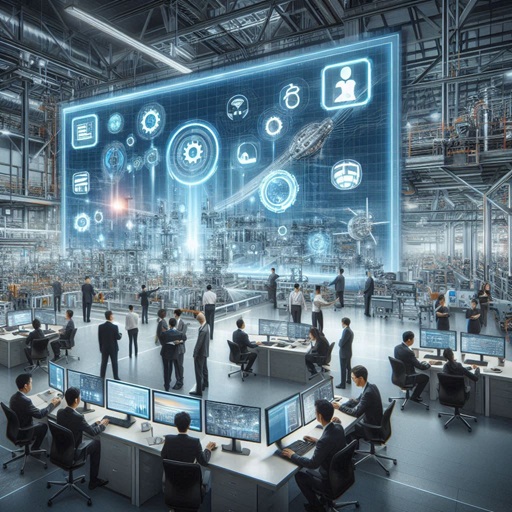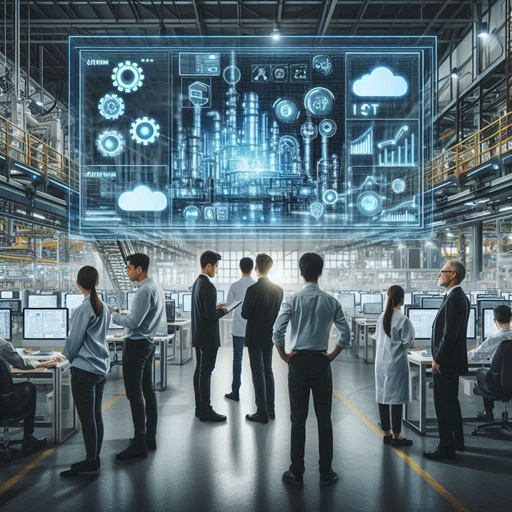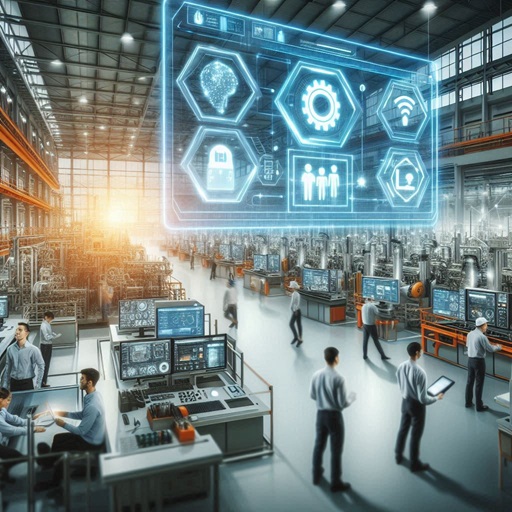The integration of Artificial Intelligence (AI) in the Industrial Internet of Things (IIoT) is transforming industries by enhancing automation, predictive maintenance, and operational efficiency. The AI impact on Industrial IoT market is evident as businesses leverage AI-driven analytics, machine learning, and real-time data processing to optimize industrial processes. This article delves into the various aspects of how AI is reshaping the IIoT landscape, highlighting key trends, benefits, challenges, and future prospects.
Understanding Industrial IoT and AI Integration
The Industrial Internet of Things (IIoT) refers to interconnected sensors, devices, and machinery that collect and exchange data in industrial settings. When combined with AI technologies, IIoT systems gain the ability to analyze vast amounts of data, predict failures, and automate decision-making. The AI impact on Industrial IoT market is accelerating due to advancements in deep learning, neural networks, and edge computing, enabling smarter factories and supply chains.
Key Trends Driving the AI Impact on Industrial IoT Market
1. Predictive Maintenance Powered by AI and Machine Learning
One of the most significant contributions of AI in the Industrial IoT market is predictive maintenance. Traditional maintenance methods rely on scheduled check-ups, which can be inefficient. AI-powered IIoT systems analyze real-time sensor data to predict equipment failures before they occur, reducing downtime and maintenance costs.
2. Enhanced Automation with AI-Driven Robotics
The AI impact on Industrial IoT market is evident in the rise of smart robotics. AI-enabled robots in manufacturing plants can adapt to dynamic environments, improving precision and productivity. These robots use computer vision and deep learning to perform complex tasks with minimal human intervention.
3. Real-Time Data Analytics for Operational Efficiency
AI enhances IIoT by processing real-time data streams from multiple sources. Factories use AI-driven analytics to monitor production lines, detect anomalies, and optimize workflows. The AI impact on Industrial IoT market is leading to smarter energy management, reduced waste, and improved quality control.
4. AI-Powered Supply Chain Optimization
Supply chains benefit immensely from AI in Industrial IoT, as machine learning algorithms predict demand fluctuations, optimize logistics, and prevent disruptions. AI-driven IIoT solutions provide end-to-end visibility, ensuring seamless coordination between suppliers, manufacturers, and distributors.
5. Edge AI for Faster Decision-Making
Edge computing combined with AI reduces latency by processing data closer to the source. The AI impact on Industrial IoT market is amplified as edge AI enables real-time decision-making in remote industrial locations without relying on cloud servers.
Current Market Valuation and Growth Projections for Industrial IoT
The global Industrial IoT market is experiencing significant expansion, with its valuation reaching USD 194.4 billion in 2024. Industry analysts project that this figure will surge to USD 286.3 billion by 2029, reflecting a compound annual growth rate (CAGR) of 8.1% over the forecast period from 2024 to 2029. This robust growth is fueled by several key factors, including the escalating demand for IoT-enabled digital transformation across various business sectors and the increasing adoption of predictive maintenance solutions to enhance machinery efficiency.
Download PDF Brochure @ https://www.marketsandmarkets.com/pdfdownloadNew.asp?id=129733727
However, despite these promising opportunities, the Industrial IoT industry faces a notable challenge—the lack of standardization in IoT protocols. This issue poses a significant restraint, as inconsistent communication standards can hinder seamless integration and interoperability between IoT devices and systems. Addressing this barrier will be crucial for unlocking the full potential of the Industrial IoT market and sustaining its upward trajectory in the coming years.
Key Drivers Fueling Industrial IoT Market Expansion
The rapid adoption of IoT-driven digital transformation is revolutionizing industries by enabling smarter automation, real-time data analytics, and improved operational efficiency. Additionally, the growing emphasis on predictive maintenance—leveraging AI and machine learning to anticipate equipment failures before they occur—is helping businesses reduce downtime and maintenance costs, further accelerating market growth.
Benefits of AI in the Industrial IoT Market
1. Increased Operational Efficiency and Cost Savings
AI-driven IIoT systems streamline operations by automating repetitive tasks and optimizing resource allocation. The AI impact on Industrial IoT market results in significant cost savings through energy efficiency, reduced downtime, and lower maintenance expenses.
2. Improved Safety and Risk Management
AI enhances workplace safety by monitoring hazardous environments and alerting workers to potential dangers. Predictive analytics in IIoT helps prevent accidents by identifying risks before they escalate.
3. Scalability and Flexibility in Industrial Processes
The AI impact on Industrial IoT market allows businesses to scale operations seamlessly. AI-powered IIoT solutions adapt to changing production demands, ensuring flexibility in manufacturing and logistics.
4. Enhanced Product Quality and Consistency
AI algorithms detect defects in real-time, ensuring high-quality production standards. The AI impact on Industrial IoT market minimizes human error and enhances consistency across industrial processes.
Challenges in Implementing AI in Industrial IoT
1. High Initial Investment and Integration Costs
Despite its benefits, the AI impact on Industrial IoT market faces challenges such as high implementation costs. Companies must invest in AI infrastructure, skilled personnel, and data security measures.
2. Data Privacy and Cybersecurity Risks
As IIoT devices generate massive data, cybersecurity becomes a critical concern. The AI impact on Industrial IoT market requires robust encryption and threat detection systems to prevent breaches.
3. Lack of Skilled Workforce and Expertise
The adoption of AI in IIoT demands specialized knowledge in AI, machine learning, and IoT technologies. The shortage of skilled professionals can hinder the AI impact on Industrial IoT market.
4. Interoperability Issues Between Legacy Systems and AI Solutions
Many industries still rely on outdated machinery that may not integrate smoothly with AI-driven IIoT platforms. Overcoming interoperability challenges is crucial for maximizing the AI impact on Industrial IoT market.
Future Outlook of AI in the Industrial IoT Market
The AI impact on Industrial IoT market is expected to grow exponentially in the coming years. Advancements in AI algorithms, 5G connectivity, and quantum computing will further enhance IIoT capabilities. Key future trends include:
- Autonomous Factories: Fully automated smart factories powered by AI and IIoT.
- AI-Driven Digital Twins: Virtual replicas of physical systems for real-time monitoring and simulation.
- Sustainable Manufacturing: AI optimizing energy consumption and reducing carbon footprints.
- Expansion of AI in Edge Devices: More industries adopting edge AI for decentralized processing.
The AI impact on Industrial IoT market is revolutionizing industries by enabling smarter, more efficient, and safer operations. From predictive maintenance to autonomous robotics, AI-driven IIoT solutions are setting new benchmarks in industrial automation. While challenges such as high costs and cybersecurity risks persist, the future of AI in IIoT promises unprecedented growth and innovation. Businesses that embrace these technologies today will lead the industrial transformation of tomorrow.
FAQs on AI Impact on Industrial IoT Market
1. How does AI improve predictive maintenance in Industrial IoT?
AI analyzes sensor data to predict equipment failures, reducing unplanned downtime and maintenance costs.
2. What are the key benefits of AI in the Industrial IoT market?
AI enhances efficiency, safety, scalability, and product quality while reducing operational costs.
3. What challenges do industries face when implementing AI in IIoT?
High costs, cybersecurity risks, lack of skilled workforce, and interoperability issues are major challenges.
4. How will AI shape the future of Industrial IoT?
AI will drive autonomous factories, digital twins, sustainable manufacturing, and edge computing advancements.
5. Which industries benefit the most from AI in Industrial IoT?
Manufacturing, logistics, energy, healthcare, and automotive sectors see significant benefits from AI-powered IIoT.
This comprehensive analysis highlights the transformative AI impact on Industrial IoT market, offering insights into current trends and future possibilities.



